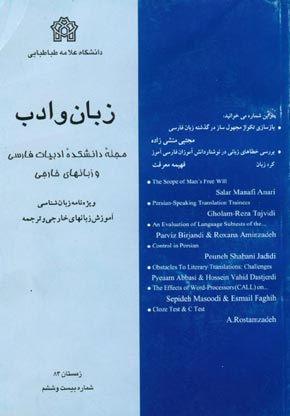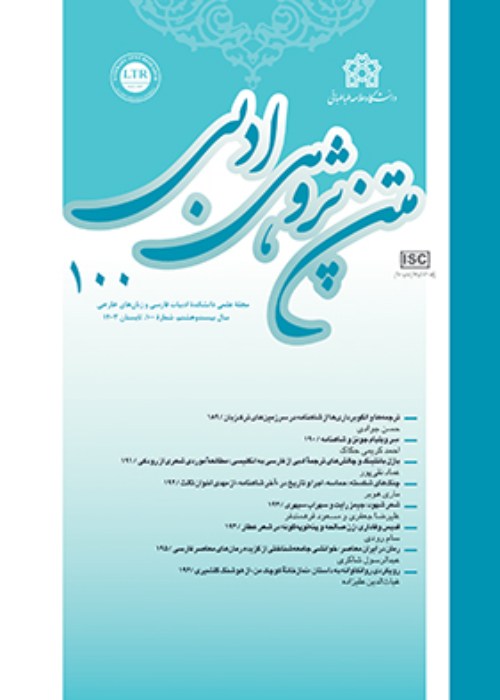فهرست مطالب

فصلنامه متن پژوهی ادبی
پیاپی 26 (زمستان 1384)
- ویژه نامه زبان شناسی ، آموزش زبانهای خارجی و ترجمه
- 216 صفحه،
- تاریخ انتشار: 1384/11/18
- تعداد عناوین: 10
-
صفحات 5-9بر اساسی همه منابع دستوری زبانهای ایرانی میانه غربی و شرقی، برای بیان مفهوم فعلی مجهول سه امکان متفاوت وجود داشت: الف: پیوستن تکواژ صرفی به ماده مضارع فعل که معمولا برای ساخت فعل مضارع مجهول و در پاره ای از موارد برای فعل ماضی جعلی مجهول به کار می رفته است.کلیدواژگان: بازسازی تکواژ، مجهول ساز، زبان فارسی
-
صفحات 10-36پژوهش حاضر ما را در رابطه با چیستی خطاهای قانونمندی که زبان آموزان مرتکب می شوند در کشف ماهیت راهبردها و فرضیه های یادگیری زبان بسیار کمک می کند. سوال های این تحقیق عبارتند از این که زبان آموزان کرد چه خطاهایی را مرتکب می شوند و بسامد تکرار هر خطا و منبع هر خطا کدام است. نوشتار 100 نفر دانش آموز کلاس پنجم ابتدایی شهرستان مهاباد در فاصله سنی 11-10 سال که زبان مادری آنها کردی (گویش مهاباد) است، بصورت انشایی با موضوع یکسان تحلیل و بررسی شد. در این تحقیق زبان آموزان در همه ی حوزه های دستوری ساخت واژی، نحوی، واژگانی - معنایی مرتکب خطا شده اند اما در حوزه ی نحوی تعداد و بسامد و درصد خطاهایشان بیشتر است. البته بطور موردی بیشترین خطا مربوط به جز ء فعلی نامناسب (ساختواژی) و کمترین خطا مربوط به شخص فعلی (نحوی) می باشد. در این تحقیق، تداخل زبان مادری یکی از منابع اصلی خطاهای زبانی محسوب میگردد. با وجود این، خطاهای بسیاری نیز از تداخل متقابل واحدها در درون زبان مقصد و راهبردهای یادگیری زبان آموز، سرچشمه می گیرند. چیزی کمتر از یک سوم خطاهای زبان آموزان، خطاهای درون زبانی هستند و حدود دوسوم آنها، خطاهای بین زبانی هستند و بخشی هم به عنوان خطاهای راهبردهای یادگیری آموزنده هستند.کلیدواژگان: خطاهای ساختاری، خطاهای نحوی، خطاهای نوشتاری، خطاهای واژگانی، معنایی فارسی آموزان کردزبان
-
صفحات 37-39
-
Pages 5-9It has been claimed That in middle Persian Languages, one way of passivization was adding suffix - Th to the present stem of the Verb. Contrary to this claim, It is proved in this article that the passive suffix was - T which historically originated from -ya - the passive morpheme in ancient Iranian Language. As we know, all the Verbal endings in middle Languages begin with the Vowel [e] as in - em, eh, ed, em, ed, end, so - h - has been a hiatus needed to be inserted between the two Vowels (The Vowel of the passive suffix and the initial Vowel in the Verbal endings). Then, the morpheme - T - and the hiatus -h - have merged into one merpheme - Th.
-
Pages 10-36The present piece of research is an attempt to discover the nature of student's written errors which help learn about the strategies learners employ and better appreciate the leaning hypotheses. More specifically this study aims at finding the what, the frequency, and the origin of errors Kurdish learners of Persian make. Written essays of I 00 students in the fifth grade of a primary school in Mahabad were analyzed. These students errors were of morphological, syntactic and lexico-scmantic types. Interference from LI just one of the sources of errors, others being the interaction between the two languages, and the learning strategies of the learners.Keywords: Morphological errors, Syntactic errors, Writing errors, Lexico-semantic errors, Persain learners of Kurdish
-
Pages 5-17Man is the only earthly creature endowed with intelligence, will, and speech, all of which are originally Divine Attributes in their absoluteness. It is due to the existence of such Divine Qualities in man that he is essentially considered as a theomorphic being and chosen as the vicegerent of Allah on earth. As the Quran (15: 29) says, Allah has breathed into man of His spirit. All the Divine qualities in man originate from spirit, the Divine aspect in him, and that is why they cease to function when the spirit leaves the material aspect of man and returns back to its Origin, Allah. The aim of this article is to discuss the scope of man's free will. Man is free but not independent. He is free to choose to do something or not to do it. Therefore, he is responsible for whatever he does out of his free will, and, as such, his responsibility is commensurate with the extent of his capacity and the scope of his free will.Keywords: will, responsibility, Spirit, freedom, intelligence
-
Pages 18-46This paper was aimed at investigating the Persian-speaking translation trainees perception of politeness of English request strategies. They judged the strategies for requesting (e.g. can, could, will, do, etc.) using the paired comparison method. The findings showed great divergence between the judgment of English native speakers with respect to the degree of politeness of 14 generic request strategies and that of the Persian-speaking translation trainees. The t-test showed no significant difference between the female and male trainees in their judgment of politeness.
-
Pages 47-69The Ph.D. entrance examinations of Islamic Azad University in Iran are administered annually to select the best applicants for Ph.D. programs. In consideration of the important decisions, which are made on the basis of the results of these examinations, the present study was conducted to provide a qualitative evaluation of field-specific language subtests (FLSs) of four entrance examinations administered in 2003. In order to accomplish the objectives of the study, the views of four different groups of participants -- field-specialists, Ph.D. students, language testers, and applied linguists -- were obtained with respect to Ph.D. student's general-academic language needs, suitability of the current FLSs of Ph.D. entrance examinations of seventeen fields of Humanities with regard to their construction, use, and scoring procedures, and the desirable characteristics of a new general-academic English subtest. Furthermore, this study involved the qualitative analysis of the content and 'structure of the items appearing on FLSs of Ph.D. entrance examinations of four fields of Humanities. The results indicated that FLSs were not consistent with Ph.D. student's general-academic language needs. Moreover, there was no commonly agreed code of practice or set of standards, which was followed by examination boards in the processes of test construction, use, and scoring. The results further indicated the need for developing a standardized Performance-based Genera! Academic (PGAE) test battery to be administered alongside existing FLSs in Ph.D. entrance examinations. This need could be due to the fact that current tests alone could not cover the full range of general academic language ability required in Ph.D. programs and thus were not appropriate measures for admissions decisions.Keywords: Evaluation, General Academic Language Ability, General Academic Language needs, Performance-based Language Test, Target Language Use (TLU) Task, Test Task
-
Pages 70-102This paper investigates control constructions m Persian by running various tests of control offered by Hornstein (1999, 2003, 2004) in his Movement Theory of Control. And those proposed by Landau (2003, 2004) in his Agree-based Approach to OC under Standard Theory of Control. The Persian data show consistency with Landau's tests of control, whereas, they prove to be inconsistent with those of Hornsteins. Therefore, Hornstein's theory that OC PRO is the residue of movement is refuted, while Landau's Agree-base Approach is supported by the data in this paper, including Persian showing case concord in its subjunctive control construction.Keywords: Control constructions, Agree-base Approach, Minimalist perspective, Movement Approach
-
Pages 103-128The translator of a literary text has to observe the semantic sense of the words, the weight, the cultural setting, and other technical features of the original text to yield an acceptable translation in the TL. The accomplishment however is not that easy, for the translator meets some major impediments in performing the task. A translator who is familiar with different critical approaches, a translator needs to, first, interpret the text and then see how the message can be conveyed in the TL, from which the reader is likely to elicit the same interpretation. Being open to interpretation on different levels, a literary text challenges the translator who has to explore the true meaning and reshape it in another system. The translator of a literary text should also interpret the text according to the cultural setting it was written in. The dominant ideology of the time does not leave literature unaffected and much of the semantic weight of the text might have been shaped accordingly. The style and structure of a literary text are different from those of the ordinary language because the intentions lying behind them are different and each style is correspondent with the purpose of the writer. Finding proper equivalences is of great importance. Due to the sundry implications and connotations words have, translators of literary texts need to find equivalences that are the most precise and capable of conveying the implied meanings. Sincere attempt is needed to transfer culture-bound idioms and proverbs from SL to TL. Literary texts are abundant with idioms and proverbs that are meaningful in the context of the culture they are part of. With all such things in mind, a satisfactory literary translation should crave creativity and knowledge on the side of the translator if the unity and pleasure of literary texts is to be kept and conveyed.Keywords: Literary translation, Language, Cultural setting, Style, Equivalence, Idiom, creativity
-
Pages 129-148The potential of computers to support learning and teaching m almost all subject areas is now widely accepted. At ail levels of education computers aid teachers to enrich their learning/teaching environment. In the field of language education, especially English as a second/foreign language (ESL/EFL) computer-assisted learning has acted as an indirect boost to enhance language proficiency. While there are controversies about the impact of computer on teaching and learning, it would seem appropriate to investigate the features of such resources which may have an influence on different learning settings and regarding various skills (Light, 1997).
-
Pages 149-168The present study was an attempt to investigate varieties of cloze test and C-test as measures of reading comprehension ability. It aimed at comparing the performances of subjects on different cloze and C-test Forms constructed from the same passage. To this end, five versions of cloze test and two versions of C-test were developed by applying different deletion techniques and deletion rates, and were labeled Form A. (Standard Cloze), Form B. (First - Half C-test), Form C. (Rational cloze), Form D. (Noun - phrase cloze), Form E. (Sentence cloze), Form F. (Independent - Dependent clause cloze), and Form G. (standard C-test). The test Forms were randomly administered to 247 EFL students along with Michigan ECPE (Examination for the Certificate of Proficiency in English) test. Nearly 35 students took each test Form. To find out which test from(s) showed a better picture of testee's reading comprehension ability, the correlation coefficients between each test Form and ECPE reading section and variance overlap were calculated. It revealed that Form C. had the highest correlation and variance overlap with ECPE reading section (.62) and enjoyed, with the exception of Form F. the highest reliability (.96). To compare the performances of subjects on test Forms and to determine their reliability and validity, two one-way ANOYAs were run and KR-21 and Pearson product moment formulas were applied. The observed F-ratio came out to be 73.15, which was considerably higher than the critical F-ratio at D.F. (6.24), i.e. . 2.14. This meant that the subjects performed differently on these Test Forms. The reliability and validity of Test Forms showed that their psychometric characteristics were also different.Keywords: redundancy in language_test of reduced redundancy_standard cloze_noun - phrase cloze_sentence cloze_independent - dependant clause cloze_standard C-test_first - half C-test_reading comprehension


